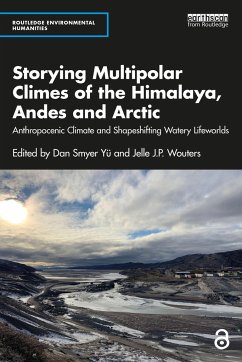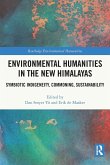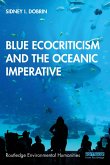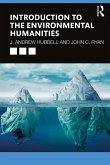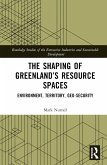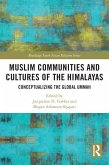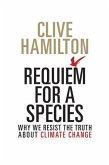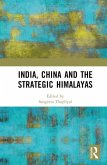This book initiates multipolar climate/clime studies of the world's altitudinal and latitudinal highlands with terrestrial, experiential, and affective approaches. Framed in the environmental humanities, it is an interdisciplinary, comparative study of the mutually-embodied relations of climate, nature, culture, and place in the Himalaya, Andes, and Arctic.
Innovation-driven, the book offers multipolar clime case studies through the contributors' historical findings, ethnographic documentations, and diverse conceptualizations and applications of clime, an overlooked but returning notion of place embodied with climate history, pattern, and changes. The multipolar clime case studies in the book are geared toward deeper, lively explorations and demonstrations of the translatability, interchangeability, and complementarity between the notions of clime and climate. "Multipolar" or "multipolarity" in this book connotes not only the two polar regions and the tectonically shaped highlands of the earth but also diversely debated perspectives of climate studies in the broadest sense. Contributors across the twelve chapters come from diverse fields of social and natural sciences and humanities, and geographically specialize, respectively, in the Himalayan, Andean, and Arctic regions.
The first comparative study of climate change in altitudinal and latitudinal highlands, this will be an important read for students, academics, and researchers in environmental humanities, anthropology, climate science, indigenous studies, and ecology.
Chapters 8 and 9 of this book are freely available as a downloadable Open Access PDF at http://www.taylorfrancis.com/books/e/10.4324/9781003347026 under a Creative Commons Attribution-Non Commercial-No Derivatives (CC-BY-NC-ND) 4.0 license.
Innovation-driven, the book offers multipolar clime case studies through the contributors' historical findings, ethnographic documentations, and diverse conceptualizations and applications of clime, an overlooked but returning notion of place embodied with climate history, pattern, and changes. The multipolar clime case studies in the book are geared toward deeper, lively explorations and demonstrations of the translatability, interchangeability, and complementarity between the notions of clime and climate. "Multipolar" or "multipolarity" in this book connotes not only the two polar regions and the tectonically shaped highlands of the earth but also diversely debated perspectives of climate studies in the broadest sense. Contributors across the twelve chapters come from diverse fields of social and natural sciences and humanities, and geographically specialize, respectively, in the Himalayan, Andean, and Arctic regions.
The first comparative study of climate change in altitudinal and latitudinal highlands, this will be an important read for students, academics, and researchers in environmental humanities, anthropology, climate science, indigenous studies, and ecology.
Chapters 8 and 9 of this book are freely available as a downloadable Open Access PDF at http://www.taylorfrancis.com/books/e/10.4324/9781003347026 under a Creative Commons Attribution-Non Commercial-No Derivatives (CC-BY-NC-ND) 4.0 license.
"Just as the summit of a mountain gives a new viewpoint, this important collection gives a fresh and critically needed perspective in the environmental humanities. Edited by leading scholars in the field, the chapters collectively and convincingly make a case for 'multipolar clime studies' as a key area of research. Grounded in rich case studies and with reflective, careful, and engaging storytelling, this is environmental humanities at its best."
Emily O'Gorman, Associate Professor, Discipline of Geography and Planning, Macquarie School of Social Sciences, Macquarie University, Australia
"This important book aims at revolutionizing climate science. It proffers the concept of 'clime' to connect technical insight with human experience. As ecological beings, we are embedded in more-than-human geographies and histories that constantly shape our relationships with water, earth, and air. This book shows that we can face planetary climate crises only by taking such diverse local comprehensions and practices very seriously. A resounding call to both climatology and the environmental humanities, it is a truly pioneering work."
Willem van Schendel, Professor of Modern Asian History, Amsterdam University, The Netherlands
"This is a remarkable multidisciplinary book that initiates new climate studies in multipolar regions. The authors are at once rigorous and imaginative, comprehensive and creative. This book will speak to those interested in the climate challenges and solutions that are both local and global, affective and discursive, culturally aware and practically relevant. An indispensable and path breaking book for specialists and non-specialists alike."
Mary Evelyn Tucker, Yale Forum on Religion and Ecology, USA; Co-author, Journey of the Universe
Emily O'Gorman, Associate Professor, Discipline of Geography and Planning, Macquarie School of Social Sciences, Macquarie University, Australia
"This important book aims at revolutionizing climate science. It proffers the concept of 'clime' to connect technical insight with human experience. As ecological beings, we are embedded in more-than-human geographies and histories that constantly shape our relationships with water, earth, and air. This book shows that we can face planetary climate crises only by taking such diverse local comprehensions and practices very seriously. A resounding call to both climatology and the environmental humanities, it is a truly pioneering work."
Willem van Schendel, Professor of Modern Asian History, Amsterdam University, The Netherlands
"This is a remarkable multidisciplinary book that initiates new climate studies in multipolar regions. The authors are at once rigorous and imaginative, comprehensive and creative. This book will speak to those interested in the climate challenges and solutions that are both local and global, affective and discursive, culturally aware and practically relevant. An indispensable and path breaking book for specialists and non-specialists alike."
Mary Evelyn Tucker, Yale Forum on Religion and Ecology, USA; Co-author, Journey of the Universe

